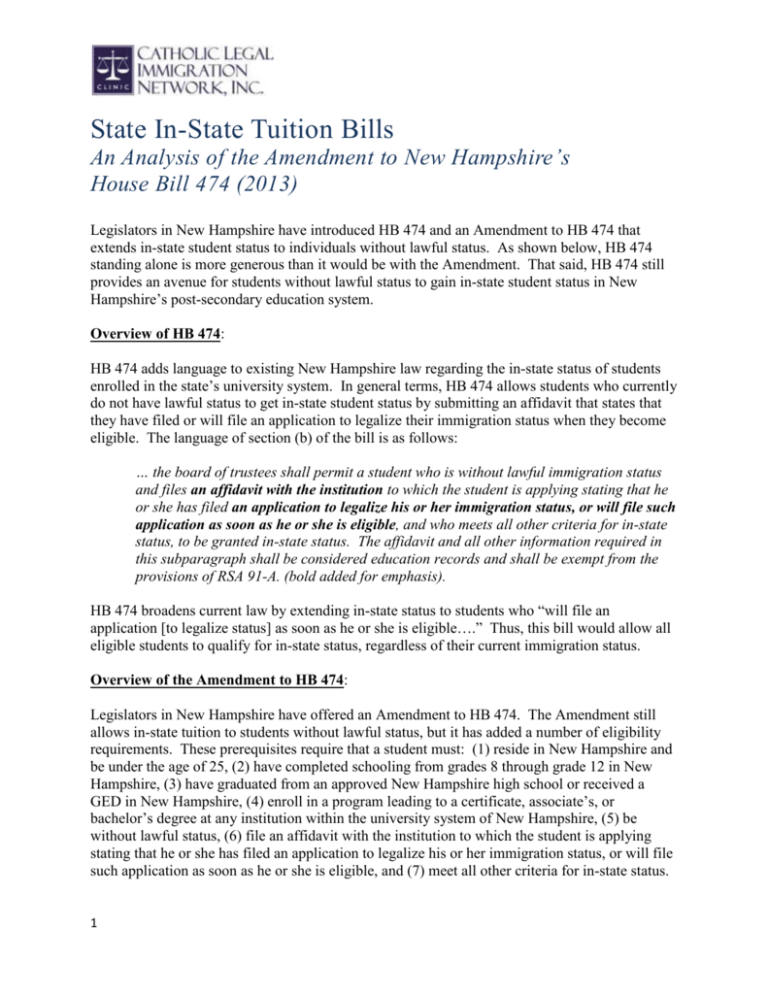The Amendment to HB 474 proposes that students complete grades
advertisement

State In-State Tuition Bills An Analysis of the Amendment to New Hampshire’s House Bill 474 (2013) Legislators in New Hampshire have introduced HB 474 and an Amendment to HB 474 that extends in-state student status to individuals without lawful status. As shown below, HB 474 standing alone is more generous than it would be with the Amendment. That said, HB 474 still provides an avenue for students without lawful status to gain in-state student status in New Hampshire’s post-secondary education system. Overview of HB 474: HB 474 adds language to existing New Hampshire law regarding the in-state status of students enrolled in the state’s university system. In general terms, HB 474 allows students who currently do not have lawful status to get in-state student status by submitting an affidavit that states that they have filed or will file an application to legalize their immigration status when they become eligible. The language of section (b) of the bill is as follows: … the board of trustees shall permit a student who is without lawful immigration status and files an affidavit with the institution to which the student is applying stating that he or she has filed an application to legalize his or her immigration status, or will file such application as soon as he or she is eligible, and who meets all other criteria for in-state status, to be granted in-state status. The affidavit and all other information required in this subparagraph shall be considered education records and shall be exempt from the provisions of RSA 91-A. (bold added for emphasis). HB 474 broadens current law by extending in-state status to students who “will file an application [to legalize status] as soon as he or she is eligible….” Thus, this bill would allow all eligible students to qualify for in-state status, regardless of their current immigration status. Overview of the Amendment to HB 474: Legislators in New Hampshire have offered an Amendment to HB 474. The Amendment still allows in-state tuition to students without lawful status, but it has added a number of eligibility requirements. These prerequisites require that a student must: (1) reside in New Hampshire and be under the age of 25, (2) have completed schooling from grades 8 through grade 12 in New Hampshire, (3) have graduated from an approved New Hampshire high school or received a GED in New Hampshire, (4) enroll in a program leading to a certificate, associate’s, or bachelor’s degree at any institution within the university system of New Hampshire, (5) be without lawful status, (6) file an affidavit with the institution to which the student is applying stating that he or she has filed an application to legalize his or her immigration status, or will file such application as soon as he or she is eligible, and (7) meet all other criteria for in-state status. 1 Analysis: This effort to modify New Hampshire’s existing law through the Amendment to HB 474 is still sound policy. As noted above, it is not as favorable as HB 474, but it still gives individuals without status an opportunity to pursue post-secondary education at the in-state tuition rate. In addition, it does not appear to conflict with federal law or with proposed versions of the federal DREAM Act. Importantly, because it is unclear if and when the federal government will pass Comprehensive Immigration Reform or the DREAM Act, it is advisable to support a state bill that helps students at this very moment rather than wait for the federal government to act. If possible, advocates at the state level should attempt to eliminate the Amendment to HB 474 or to tweak it in order to increase students’ access to post-secondary education. A few arguments listed below may assist in their advocacy efforts. More students would benefit from the legislation if it did not include an age restriction and a requirement that students attend school in New Hampshire for five years. The Amendment to HB 474 proposes that students complete grades 8 through 12 in New Hampshire. This seems arduous. Of the states that have laws allowing students without status to pay in-state tuition rates at post-secondary institutions, none have required that students be enrolled in school in the state for 5 years.1 Indeed, eight states require 3 years of high school in the state. These states are: California, Illinois, Kansas, Maryland, Nebraska, Rhode Island, Texas, and Utah. Three states require 2 years of high school in the state. These states are: New York, Oklahoma, and Washington. One state, New Mexico, requires 1 year of high school in the state. One state, Connecticut, requires 4 years of high school in the state. The Amendment to HB 474 restricts eligibility to students under the age of twenty-five. This requirement appears arbitrary and likely will limit the number of students who are able to enroll in post-secondary education. Limiting access to higher education does not make good economic sense. On the contrary, it is advisable for New Hampshire to increase access to post-secondary education as the state’s future depends on the development of a more educated work force. If college is within reach, students are more likely to work hard to excel in high school and their families are more likely to make the necessary sacrifices to pay for college. Each student who attends college and obtains a professional job helps to bolster New Hampshire’s economy through wages, tax payments, and consumption of goods and services. It also means that they are less likely to drain the social service budget of the state. Indeed, students whose aspirations and educational opportunities are limited are more likely to drop out of school and become part of a permanent underclass in society with added social costs. National Immigration Law Center, “Table: Laws & Policies Improving Access to Higher Education For Immigrants.” http://www.nilc.org/eduaccesstoolkit2a.html#tables. 1 2 Access to higher education makes sense for other reasons as well.2 Experiences in states that have passed in-state tuition bills suggest that such legislation raises the percentage of high school graduates who pursue a college degree. In addition, the students who benefit from in-state tuition bills tend to be hard-working and goal-oriented, with high academic standing. Moreover, experts in states that have already passed legislation like HB 474 have reported that the cost of implementation has been negligible. Because in-state tuition is not the same as free tuition, the money paid by these students actually tends to increase school revenues because it represents income that would not otherwise be there. This document was prepared in February 2013 by CLINIC’s State & Local Advocacy Attorney, Karen A. Herrling. This document is for informational purposes only and is not intended as legal advice. For questions, please contact Karen Herrling at (717) 396-3893. Information in this paragraph was gleaned from the National Immigration Law Center, “Basic Facts about In-State Tuition for Undocumented Immigrant Students, “(January 2012). http://www.nilc.org/basic-facts-instate.html. For additional resources please go to NILC’s website for an excellent tool kit on “Access to Post-Secondary Education.” www.nilc.org/eduaccesstoolkit.html 2 3





